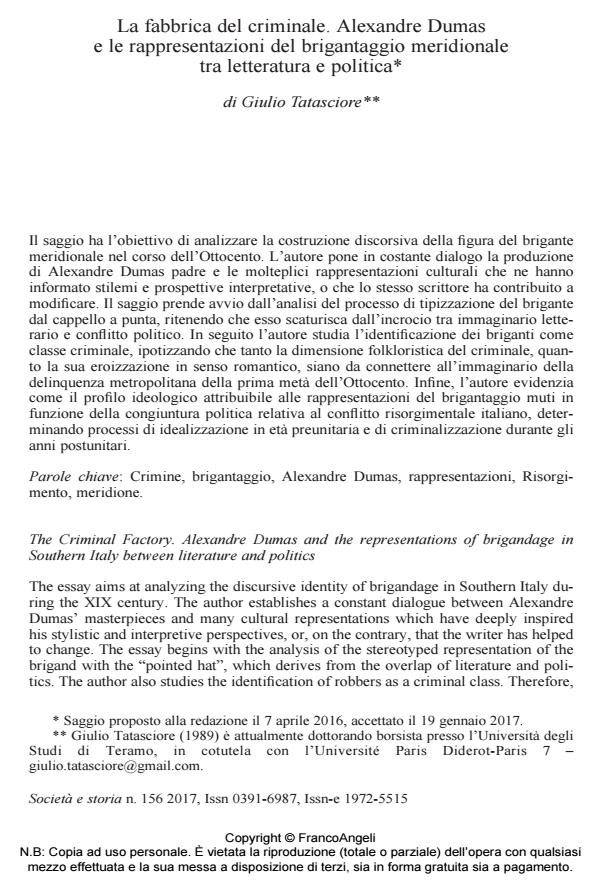La fabbrica del criminale. Alexandre Dumas e le rappresentazioni del brigantaggio meridionale tra letteratura e politica
Titolo Rivista SOCIETÀ E STORIA
Autori/Curatori Giulio Tatasciore
Anno di pubblicazione 2017 Fascicolo 2017/156
Lingua Italiano Numero pagine 35 P. 269-303 Dimensione file 123 KB
DOI 10.3280/SS2017-156002
Il DOI è il codice a barre della proprietà intellettuale: per saperne di più
clicca qui
Qui sotto puoi vedere in anteprima la prima pagina di questo articolo.
Se questo articolo ti interessa, lo puoi acquistare (e scaricare in formato pdf) seguendo le facili indicazioni per acquistare il download credit. Acquista Download Credits per scaricare questo Articolo in formato PDF

FrancoAngeli è membro della Publishers International Linking Association, Inc (PILA), associazione indipendente e non profit per facilitare (attraverso i servizi tecnologici implementati da CrossRef.org) l’accesso degli studiosi ai contenuti digitali nelle pubblicazioni professionali e scientifiche.
Il saggio ha l’obiettivo di analizzare la costruzione discorsiva della figura del brigante meridionale nel corso dell’Ottocento. L’autore pone in costante dialogo la produzione di Alexandre Dumas padre e le molteplici rappresentazioni culturali che ne hanno informato stilemi e prospettive interpretative, o che lo stesso scrittore ha contribuito a modificare. Il saggio prende avvio dall’analisi del processo di tipizzazione del brigante dal cappello a punta, ritenendo che esso scaturisca dall’incrocio tra immaginario letterario e conflitto politico. In seguito l’autore studia l’identificazione dei briganti come classe criminale, ipotizzando che tanto la dimensione folkloristica del criminale, quanto la sua eroizzazione in senso romantico, siano da connettere all’immaginario della delinquenza metropolitana della prima metà dell’Ottocento. Infine, l’autore evidenzia come il profilo ideologico attribuibile alle rappresentazioni del brigantaggio muti in funzione della congiuntura politica relativa al conflitto risorgimentale italiano, determinando processi di idealizzazione in età preunitaria e di criminalizzazione durante gli anni postunitari.
Parole chiave:Crimine, brigantaggio, Alexandre Dumas, rappresentazioni, Risorgimento, meridione.
- Il legittimismo duosiciliano e i "Garibaldi borbonici" Borges (e Tristany) Giuseppe Carrieri, in SOCIETÀ E STORIA 179/2023 pp.31
DOI: 10.3280/SS2023-179003
Giulio Tatasciore, La fabbrica del criminale. Alexandre Dumas e le rappresentazioni del brigantaggio meridionale tra letteratura e politica in "SOCIETÀ E STORIA " 156/2017, pp 269-303, DOI: 10.3280/SS2017-156002